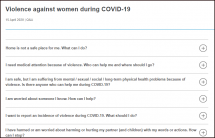Questions and Answers about Violence against Women and COVID-19
This page offers health workers as well as the general public answers to questions about violence against women in the context of COVID-19.
The questions include:
- Home is not a safe place for me. What can I do?
- I need medical attention because of violence. Who can help me and where should I go?
- I am safe, but I am suffering from mental / sexual / social / long-term physical health problems because of violence. Is there anyone who can help me during COVID-19?
- I am worried about someone I know. How can I help?
- I want to report an incidence of violence during COVID-19. What should I do?
- I have harmed or am worried about harming or hurting my partner (and children) with my words or actions. How can I stop?
- I am a health worker. How can I help women survivors of violence during COVID-19?
- I run a health facility. What can I do to support women survivors of violence during COVID-19?
- I am a policy maker. What can I do to prevent and address violence against women during COVID-19?
- Has violence against women increased since the beginning of the COVID-19 pandemic?
- How does COVID-19 increase risks of violence for women?
- Who is most vulnerable?
- Why should I care about violence against women during COVID-19?
Last modified: June 17, 2020
Language: English

